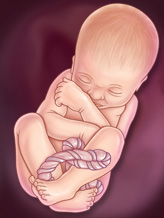
Your baby's development in late pregnancy
By 33 weeks of pregnancy, the baby's brain and nervous system are fully developed.
Your baby's bones are also continuing to harden, apart from the skull bones.
These will stay soft and separated until after the birth, to make the journey through the birth canal easier ÔÇô the bones can move gently and slide over each other so the head can be born safely, while still protecting the brain.
Your baby is curled up in the uterus now, with legs bent up towards the chest. There's little room to move about, but he or she will still change position, so you'll still feel movements and be able to see them on the surface of your bump.
If your baby is a boy, his testicles are beginning to descend from his abdomen into his scrotum.
By 36 weeks, your baby's lungs are fully formed and ready to take their first breath after the birth. She or he will also be able to suckle for feeds now, and the digestive system is fully prepared to deal with breast milk.
Your body in late pregnancy
You'll probably find you need to slow down because the extra weight makes you tired, and you may get backache.
From around now, you may be aware of your uterus tightening from time to time. These are known as Braxton Hicks contractions, and are a normal part of pregnancy ÔÇô your uterus is "practising" for the tightenings, or contractions, of labour. It's only when they become painful or frequent that you need to contact your midwife or hospital.
Only around 5% of babies arrive on their due date. You can find more information about signs labour has started and what happens in labour.
If you have children already, you may want to make childcare arrangements for when you go into labour. Pack your bag ready for the birth if you're planning to give birth in hospital or a midwifery unit.
When you're around 36 weeks pregnant, make sure you have all your important telephone numbers handy in case labour starts. Find out about the signs of labour.
You can also read information for the public from the National Institute for Health and Care Excellence (NICE) on the care of women and babies in labour.
Tips for late pregnancy
Be prepared by learning about all the ways you can relieve pain during labour so you can decide what's best for you. Find out about pain relief during labour.
You can make your birth plan. Think about your preferences for labour, such as pain relief and positions you might want to be in. You can save your birth plan online, or print out a blank form to fill in and discuss with your midwife.
Find out about infections that can affect your pregnancy and how to protect yourself, including cytomegalovirus, slapped cheek, and toxoplasmosis.
Women are advised to have the whooping cough vaccination in pregnancy between about 20 weeks and 32 weeks. You can still have it from 33 weeks ÔÇô it may not directly protect your baby, but would help protect you from whooping cough and passing it on to your baby.
You can save a to-do list online to keep track of all the essentials for your pregnancy.
Labour that starts before 37 weeks is considered premature. If your baby is born early, he or she may need special care in hospital. Find out what to expect if labour starts early.
Warning signs during late pregnancy
Bleeding from your vagina may be a sign of a serious problem, so seek help if you have vaginal bleeding in pregnancy.
High blood pressure and protein in the urine are signs of high blood pressure and pre-eclampsia, which can be life threatening if untreated.
Itching at any stage of pregnancy can be a sign of the rare liver disorder intrahepatic cholestasis of pregnancy, sometimes called obstetric cholestasis or OC.
Pregnancy week by week
Find out what's happening to you and your baby at:
0-8 weeks pregnant
9, 10, 11, 12 weeks pregnant
13, 14, 15, 16 weeks pregnant
17, 18, 19, 20 weeks pregnant
21, 22, 23, 24 weeks pregnant
25, 26, 27, 28 weeks pregnant
29, 30, 31, 32 weeks pregnant
37, 38, 39, 40 weeks pregnant
Over 40 weeks pregnant
Find maternity services near you.

